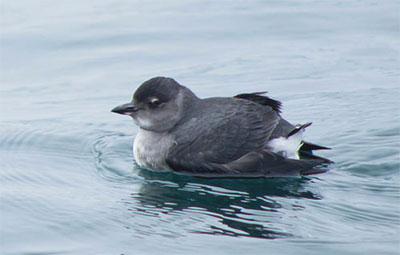In the fall of 2014 and early winter of 2015, an estimated 250,000 to 500,000 seabirds known as Cassin's auklets (Ptychoramphus aleuticus) died along the Pacific Coast from California to British Columbia, Canada. Researchers have now reported the reason in the journal Geophysical Research Letters (April 2018)—they simply starved to death. Cassin's auklets are small seabirds with gray-brown feathers and bright-blue feet that spend most of their life on the open ocean near the edge of the continental shelf, where they feed on zooplankton—small crustaceans, such as euphausids (krill) and copepods. See also: Continental margin; Copepoda; Euphausiacea; Ocean; Pacific Ocean; Zooplankton

The researchers based their findings on ocean temperature data, zooplankton abundance studies, and a database of bird mortality recorded by more than 800 citizen scientists (volunteers) who documented the bird carcasses that washed up on beaches. In piecing together the puzzle of the mass starvation, the researchers found that the unusually warm water off the Pacific Northwest of North America from 2013 to 2015, known as the warm "blob," caused a steep decline in the energy-rich (fatty) cold-water zooplankton that normally inhabit these waters; consequently, they were replaced by smaller, less nutritious (less fatty) zooplankton that had migrated from warmer southern waters. For the Cassin's auklets, it was not the abundance of zooplankton that mattered, but the nutrient quality of the food. See also: Ecosystem; Food web; Marine ecology; Seawater; Seawater fertility; Warm blob in the Pacific Ocean
This research highlights the potential perils of extreme ocean warming events on the food webs of sensitive ecosystems in a changing climate. On a positive note, in June 2017, zooplankton in the region had transitioned back to cold-water species, according to the National Oceanic and Atmospheric Administration (NOAA), suggesting that the ecosystem might be heading back to normal. See also: Global climate change; Ocean warming; Species and global climate change





